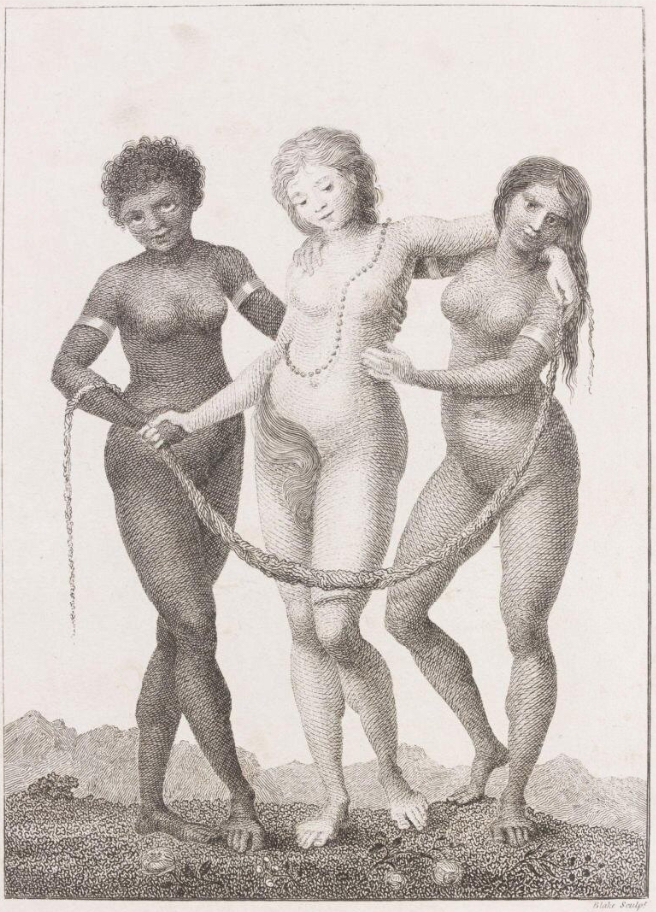
植民地モダニティ・植民地近代性
Colonial modernity
Narrative of a five years' expedition against the revolted Negroes of Surinam, by Blake, William, 1757-1827[白人種は自らの足で自立できない]
☆植
民地モダニティとは、植民地化された地域におけるモダニティの経験は、植民地構造やプロセスと密接に絡み合い、それらによって形作られてきたという概念を
指し示す。これは、植民地主義が単なる政治的・経済的なシステムではなく、植民地社会におけるモダニティの形成と理解に影響を与えた文化的・知的力であっ
たことを強調している。
| Colonial modernity
refers to the concept that the experience of modernity in colonized
regions was intertwined with and shaped by colonial structures and
processes. It highlights how colonialism wasn't just a political and
economic system but also a cultural and intellectual force that
influenced the development and understanding of what constitutes
modernity in colonized societies. |
植
民地モダニティとは、植民地化された地域におけるモダニティの経験は、植民地構造やプロセスと密接に絡み合い、それらによって形作られてきたという概念を
指し示す。これは、植民地主義が単なる政治的・経済的なシステムではなく、植民地社会におけるモダニティの形成と理解に影響を与えた文化的・知的力であっ
たことを強調している。 |
| Colonialism's impact on modernization: |
植民地主義が近代化に与えた影響: |
| Colonial
powers introduced institutions, ideologies, and practices associated
with modernity (e.g., industrialization, urbanization, capitalist
systems) into colonized territories. These were often imposed from
above and shaped by the colonizers' interests, leading to a hybrid and
uneven form of modernization. |
植民地支配国は、近代化に関連する制度、イデオロギー、慣行(工業化、都市化、資本主義体制など)を植民地領土に導入した。これらは多くの場合、植民地支配者によって上から押し付けられ、その利益によって形作られ、ハイブリッドで不均衡な近代化をもたらした。 |
| The construction of the "other": |
「他者」の構築: |
| Colonialism
created a binary between the "civilized" West and the "uncivilized"
colonized, with the latter often being portrayed as backward or needing
to be "modernized" by the colonizers. This framing influenced how
colonized societies viewed themselves and their own histories. |
植民地主義は、「文明化された」西洋と「未開の」植民地という二分法を生み出し、後者はしばしば後進的であるか、植民地支配者によって「近代化」される必要があるものと描かれてきた。この枠組みは、植民地社会が自身と自国の歴史をどのように捉えるかに影響を与えた。 |
| The role of hybridity and agency: |
ハイブリッド性と主体性(エージェンシー)の役割: |
| While
colonialism imposed its own forms of modernity, colonized societies
also actively engaged with and adapted aspects of it in ways that
reflected their own needs, desires, and cultures. This resulted in
hybrid forms of modernity that were unique to each colonial context. |
植民地主義が独自の近代性を押し付けた一方で、植民地社会も、自らのニーズ、願望、文化を反映した形で、その一部を積極的に取り入れ、適応させた。その結果、それぞれの植民地状況に特有なハイブリッドな近代性が生まれた。 |
| Coloniality of power: |
権力の植民地性: |
| This
concept, often associated with decolonial thinking, emphasizes how the
logic of colonialism continues to shape global power relations and
knowledge systems, even after formal colonial rule has ended. |
この概念は、しばしば脱植民地化思考と関連付けられ、正式な植民地支配が終結した後も、植民地主義の論理がグローバルな権力関係や知識体系を形作っていることを強調している。 |
| In
essence, colonial modernity explores the complex and often
contradictory relationship between colonialism and modernity, arguing
that the development of modernity in colonized regions was not a simple
process of replication but one shaped by the specificities of the
colonial encounter. |
本質的に、植民地近代性は、植民地主義と近代性の複雑でしばしば矛盾する関係を探求し、植民地化された地域における近代性の発展は、単純な複製プロセスではなく、植民地支配の特殊性によって形作られたプロセスであったと主張している。 |
| Google AI, Colonial modernity. |
https://www.deepl.com/ja/translator |
リ ンク
文 献
そ の他の情報
CC
Copyleft,
CC, Mitzub'ixi Quq Chi'j, 1996-2099